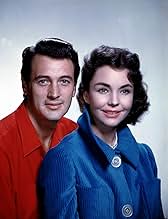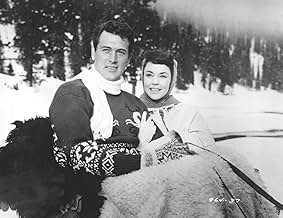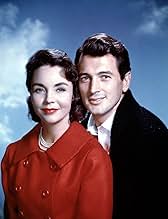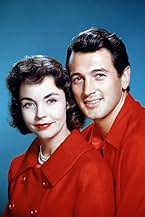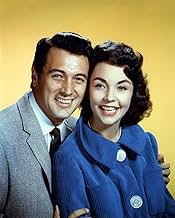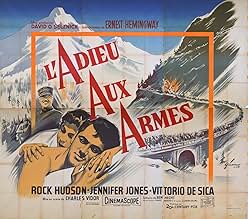VALUTAZIONE IMDb
5,8/10
3064
LA TUA VALUTAZIONE
Un'infermiera inglese e un soldato americano si incontrano sul fronte italiano, si innamorano durante la prima guerra mondiale, ma gli orrori che li circondano mettono a dura prova la loro s... Leggi tuttoUn'infermiera inglese e un soldato americano si incontrano sul fronte italiano, si innamorano durante la prima guerra mondiale, ma gli orrori che li circondano mettono a dura prova la loro storia d'amore.Un'infermiera inglese e un soldato americano si incontrano sul fronte italiano, si innamorano durante la prima guerra mondiale, ma gli orrori che li circondano mettono a dura prova la loro storia d'amore.
- Regia
- Sceneggiatura
- Star
- Candidato a 1 Oscar
- 1 vittoria e 2 candidature totali
José Nieto
- Major Stampi
- (as Jose Nieto)
Georges Bréhat
- Captain Bassi
- (as Georges Brehat)
Luigi Barzini
- Court Martial Colonel
- (non citato nei titoli originali)
Memmo Carotenuto
- Nino the Doorkeeper
- (non citato nei titoli originali)
Recensioni in evidenza
Obviously, a great deal of time and money was lavished on this project. Producer Selznick intended it to be a vindication of a career that peaked with "Gone With The Wind" in 1939, and then began a long, slow, almost painful decline. By the mid fifties he had become something of a "has-been" in Hollywood. The result? Pretty much a miss. The book is probably unfilmable, of course, but the screenplay still leaves much to be desired. Rock Hudson is far too shallow to make a go at the over-the-top emotionalism this story needs. The usually wonderful Jennifer Jones, for whom this project was conceived, somehow doesn't seem to exhibit the idealism and resolve the part needs, and that she demonstrated with such seemingly effortlessness in many other films. The direction is stilted and sometimes downright awkward, more the fault of producer Selznick, I would bet, who had a reputation for micro-managing his films, than famed director Charles Vidor.
Simply put, I'm never convinced, not even for a moment, that what is happening is real and not just another movie. Too bad.
Simply put, I'm never convinced, not even for a moment, that what is happening is real and not just another movie. Too bad.
I really wanted to like A Farewell to Arms. But despite for love for Ernest Hemingway and for Rock Hudson, A Farewell to Arms just didn't work for me. Granted it does look amazing, with ravishing use of CinemaScope and the scenery and costumes are gorgeous as you can see in the first hour. The direction is fine, and the music is beautiful and cleverly composed. However, in the pace the film was very pedestrian, but the pace wasn't the only dull thing about it. I am especially talking about the story, which was overall uninteresting and wasn't affecting, and the script, which is really stilted in a lot of scenes. The ending also felt abrupt. The acting is not good, considering how talented the actors are. I love Rock Hudson, and he visibly tries hard and looks really handsome here but he seems very out of his depth. Jennifer Jones is miscast, and her performance is a very uneven mix of overacting and underacting, also she seems very detached from her character and Hudson as well. As for Vittoria di Sica, he overdoes it so wildly you feel as though he accidentally walked onto the wrong set. All in all, despite the talented cast and director and the beautiful visuals and score, the film was dull. 3/10 Bethany Cox
Strange that one of America's favorite writers has no success in having his novels transferred to the screen with any fidelity or improvement over the original. 'A Farewell to Arms' is a lumbering, turgid, over-stuffed movie that never seems real. Chemistry between Hudson and Jones is simply not there--Jennifer Jones, in particular, seems remote and detached as the nurse even when she's supposed to be wildly in love. And then there's the matter of length--it seems to go on forever with a very weak resolution.
David O. Selznick wanted to create something that would rank alongside his 'Gone with the Wind' as an epic romance with a war background--but the talky script defeated everyone. Hemingway himself publicly disowned the movie, claiming that Jones was far too old for the part and unhappy about the film in general. At any rate, it was not the hoped for success and did nothing to halt the decline of Selznick's career--or Jennifer Jones' career for that matter. A big disappointment.
David O. Selznick wanted to create something that would rank alongside his 'Gone with the Wind' as an epic romance with a war background--but the talky script defeated everyone. Hemingway himself publicly disowned the movie, claiming that Jones was far too old for the part and unhappy about the film in general. At any rate, it was not the hoped for success and did nothing to halt the decline of Selznick's career--or Jennifer Jones' career for that matter. A big disappointment.
Recently read the book...disappointed by the movie as it departed from the story in several key areas. The scenery was pretty.
Of the top 6 reviews I currently see here, 3 are slamming Jennifer Jones for being too old, 1 is slamming producer David Selznick for being in the decline of his career, 1 is whining that it's not like the book, and 1 is slamming writer Hemingway for not doing any fighting in the war (Um... he was an ambulance driver).
While this film may not deserve an Academy award for best picture, it certainly deserves a decent review on IMDb dedicated to the film itself. So here goes my attempt.
"A Farewell to Arms" is a lavish production of a love story set against the backdrop of World War I. In that respect it's in the same genre as other classic war romances "Gone with the Wind", "Casablanca" and "Platoon ". Haha just checking to see if you're paying attention. Everyone knows "Casablanca" was not set in a war but an occupation.
Where "Farewell" differs from these other classics is in the distribution of war & romance. "Farewell" features far more battle scenes (4) compared to "Gone with the Wind" (zero) and "Casablanca" (zero). The result may be a bit disappointing in the romance department, and several reviewers (as well as the New York Times review on the film's release) have complained about the "lack of chemistry" between the two leads. I think this perception is simply due to the fact that less time is spent setting up the romance, putting more of a burden on the viewer to accept a relationship that simply happens. Viewers may also feel romantically cheated because this is not a traditional romance between two traditional individuals who dream of immediately getting married and having kids and a dog. But in fact this purposely informal, slightly dysfunctional romance is what ultimately made it interesting to me because it marked a change of formula in the age-old Hollywood romance.
If you see this movie, pay close attention to Jennifer Jones' excellent portrayal of a reluctant lover who is perhaps suffering from too many demons to actually fall in love completely, the way she wants to. She is riddled with insecurities, conflicts and possibly guilt, making her like the the stereotypical guy who can't commit. Meanwhile Rock Hudson plays a character more like the stereotypical lovesick schoolgirl. If you enjoy stereotype reversals like this, you'll definitely find yourself interested in their "lack of chemistry".
Was Jennifer Jones too old (late 30s) to play the role of Katherine as Hemingway had intended her (early 20s)? Probably. Did Jennifer get the part because she was married to producer Selznick? Absolutely. Does any of this make her a bad actress? No way. Short of Vivien Leigh, I think she was the best person to play the role as she did: the troubled lover whose cynical, morbid thoughts were always brewing not far away, despite her outwardly cheerful appearance. Actually I take back the thing about Vivien Leigh being better; the more I think about it, Jennifer was ideal for this sort of character.
A subplot involving Vittorio de Sica's war-weary character descending into madness is sure to catch your attention. It was actually my favorite part of the movie, and I wish they had spent more time on this complex character shift as well as his interesting polite antagonism of the church (with a spectacular short speech he says to the priest near the end). But alas, with the romance and the battle scenes already vying for screen time, Vittorio's story only got 2 or 3 dedicated scenes. They were powerful nonetheless.
Yes, as others mentioned, the ending seemed abrupt. But after thinking about it, I think it was perfectly in line with some of the interesting & unusual themes that the story set up. In short, this is not a straightforward soldier-meets-girl love story. The conflicts that are presented (particularly in Jennifer Jones' mysteriously troubled psyche) make this romance much more than meets the eye. If you enjoy wartime romances that are not always formulaic love stories (i.e. they may contain hidden dysfunctional surprises), check this one out.
While this film may not deserve an Academy award for best picture, it certainly deserves a decent review on IMDb dedicated to the film itself. So here goes my attempt.
"A Farewell to Arms" is a lavish production of a love story set against the backdrop of World War I. In that respect it's in the same genre as other classic war romances "Gone with the Wind", "Casablanca" and "Platoon ". Haha just checking to see if you're paying attention. Everyone knows "Casablanca" was not set in a war but an occupation.
Where "Farewell" differs from these other classics is in the distribution of war & romance. "Farewell" features far more battle scenes (4) compared to "Gone with the Wind" (zero) and "Casablanca" (zero). The result may be a bit disappointing in the romance department, and several reviewers (as well as the New York Times review on the film's release) have complained about the "lack of chemistry" between the two leads. I think this perception is simply due to the fact that less time is spent setting up the romance, putting more of a burden on the viewer to accept a relationship that simply happens. Viewers may also feel romantically cheated because this is not a traditional romance between two traditional individuals who dream of immediately getting married and having kids and a dog. But in fact this purposely informal, slightly dysfunctional romance is what ultimately made it interesting to me because it marked a change of formula in the age-old Hollywood romance.
If you see this movie, pay close attention to Jennifer Jones' excellent portrayal of a reluctant lover who is perhaps suffering from too many demons to actually fall in love completely, the way she wants to. She is riddled with insecurities, conflicts and possibly guilt, making her like the the stereotypical guy who can't commit. Meanwhile Rock Hudson plays a character more like the stereotypical lovesick schoolgirl. If you enjoy stereotype reversals like this, you'll definitely find yourself interested in their "lack of chemistry".
Was Jennifer Jones too old (late 30s) to play the role of Katherine as Hemingway had intended her (early 20s)? Probably. Did Jennifer get the part because she was married to producer Selznick? Absolutely. Does any of this make her a bad actress? No way. Short of Vivien Leigh, I think she was the best person to play the role as she did: the troubled lover whose cynical, morbid thoughts were always brewing not far away, despite her outwardly cheerful appearance. Actually I take back the thing about Vivien Leigh being better; the more I think about it, Jennifer was ideal for this sort of character.
A subplot involving Vittorio de Sica's war-weary character descending into madness is sure to catch your attention. It was actually my favorite part of the movie, and I wish they had spent more time on this complex character shift as well as his interesting polite antagonism of the church (with a spectacular short speech he says to the priest near the end). But alas, with the romance and the battle scenes already vying for screen time, Vittorio's story only got 2 or 3 dedicated scenes. They were powerful nonetheless.
Yes, as others mentioned, the ending seemed abrupt. But after thinking about it, I think it was perfectly in line with some of the interesting & unusual themes that the story set up. In short, this is not a straightforward soldier-meets-girl love story. The conflicts that are presented (particularly in Jennifer Jones' mysteriously troubled psyche) make this romance much more than meets the eye. If you enjoy wartime romances that are not always formulaic love stories (i.e. they may contain hidden dysfunctional surprises), check this one out.
Lo sapevi?
- QuizRock Hudson turned down The Bridge on the River Kwai (1957), Sayonara (1957) and Ben-Hur (1959) in order to make this film. He later said this was the biggest mistake of his career.
- BlooperThe British nurses at the hospital all have American accents.
- Citazioni
Major Alessandro Rinaldi: She's very strange, very moody, who knows she might even prefer you to me.
- Curiosità sui creditiProducer David O. Selznick tries to imitate the opening credits of his classic film, "Gone With The Wind", by having the letters of the title "A Farewell to Arms" sweep slowly across the screen from right to left.
- ConnessioniFeatured in Kronos: The Ghost of Nero (1967)
I più visti
Accedi per valutare e creare un elenco di titoli salvati per ottenere consigli personalizzati
- How long is A Farewell to Arms?Powered by Alexa
Dettagli
- Data di uscita
- Paese di origine
- Lingue
- Celebre anche come
- Adiós a las armas
- Luoghi delle riprese
- Venzone, Udine, Friuli-Venezia Giulia, Italia(first 20 minutes)
- Azienda produttrice
- Vedi altri crediti dell’azienda su IMDbPro
Botteghino
- Budget
- 4.353.000 USD (previsto)
- Lordo in tutto il mondo
- 18.989 USD
- Tempo di esecuzione2 ore 21 minuti
- Colore
- Proporzioni
- 2.35 : 1
Contribuisci a questa pagina
Suggerisci una modifica o aggiungi i contenuti mancanti

Divario superiore
By what name was Addio alle armi (1957) officially released in India in English?
Rispondi

